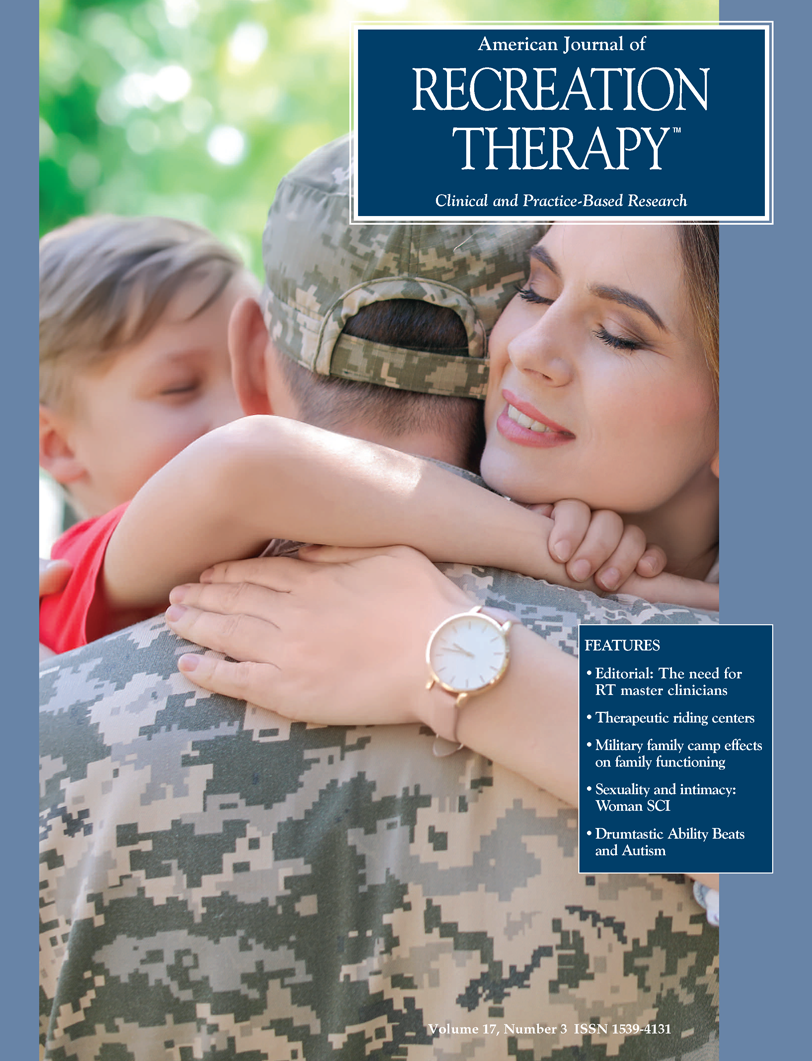A qualitative study on the social-emotional benefits of Drumtastic Ability Beats® for children with autism spectrum disorder
DOI:
https://doi.org/10.5055/ajrt.2018.0166Keywords:
autism spectrum disorder, drumming, creativity, social-emotional, self-regulationAbstract
This qualitative collective case study explored the social-emotional benefits of Drumtastic Ability Beats® in a dyadic partnership between children with autism spectrum disorder (ASD) and a college graduate student (GS). Fourteen male campers, ages 5-14, engaged in eight, 1-hour Drumtastic Ability Beats® sessions, twice a week, at a 4-week camp for children with ASD. Data collection focused on observational narrative field notes completed by the campers’ GS partner after each session. Thematic analysis revealed three primary themes: (1) familiarization through synchronization, (2) creative self-expression, and (3) self-regulation of emotions. These findings underscore the potential value of group drumming as a means to promote opportunities to enhance social-emotional regulation through facilitating relationships for children with ASD.
References
American Psychiatric Association: Desk Reference for Diagnostic and Statistical Manual of Mental Disorders. 5th ed. Washington, DC: APA, 2013.
Autism Speaks: What is autism? Available at https://www.autismspeaks.org/sites/default/files/docs/what_is_autism_adult.pdf. Accessed June 8, 2018.
Lowry RG, Hale BJ, Draper SB, et al.: Rock drumming enhances motor and psychosocial skills of children with emotional and behavioral difficulties. Int J Dev Disabil. 2018 (in press). doi:10.1080/20473869.2018.1429041.
Dinishak J, Akhtar N: A critical examination of mind-blindess as a metaphor for autism. Child Dev Perspect. 2013; 7: 110-114.
Chevallier C, Kohls G, Troiani V, et al.: The social motivation theory of autism. Trends Cogn Sci. 2012; 16: 231-239.
Kleinspehn-Ammerlahn A, Riediger M, Schmiedek F, et al.: Dyadic drumming across the life span reveals a zone of proximal development in children. Dev Psychol. 2011; 47: 632-644. doi:10.1037/a0021818.
Trost W, Frühholz S, Schön D, et al.: Getting the beat: Entrainment of brain activity by musical rhythm and pleasantness. NeuroImage. 2014; 103: 55-64.
Guzic BL, Tonkin K, Roberts JB, et al.: Using percussion to improve attention-to-tasks in children with autism. Except Parent. 2011; 41: 18-20.
Institute for Music and Neurological Function: Music therapy. Available at http://www.imnf.org/. Accessed July 1, 2017.
Ho P, Tsao JI, Bloch L, et al.: & The impact of group drumming on social emotional behavior in low-income children. Evid Based Complement Alternat Med. 2011; 8: 1-14.
Ekins C, Boehr-Wright J, Schulz H, et al.: Effects of a Drums Alive® kid beats intervention on motor skills and behavior in children with intellectual disabilities: A pilot study. Palaestra. 2018 (in press).
Locke K, Clark D: Can African drumming impact social/emotional development of young children. Can Child. 2009; 34: 10-15.
Flores K, van Niekerka C, le Roux L: Drumming as a medium to promote emotional and social functioning of children in middle childhood in residential care. Music Educ Res. 2016; 18: 254-268.
Stone NN: Hand-drumming to build community: The story of the Whittier drum project. New Dir Youth Dev. 2005; 106: 73-83.
Wood L, Ivery P, Donovan R, et al.: To the beat of a different drum: Improving the social and mental wellbeing of atrisk young people through drumming. J Public Ment Health 2013; 12: 70-79.
Willemin TA, Litchke LG, Liu T, et al.: Social emotional effects of Drumtastic®: A dyadic within-group drumming pilot program for children with autism spectrum disorder. Int J Spec Educ. 2018; 33: 94-103.
Centers for Disease Control and Prevention (CDC): Autism spectrum disorder data and statistics. 2016. Available at https://www.cdc.gov/ncbddd/autism/data.html. Accessed June 8, 2018.
Kartasidou L, Varsamis P, Sampsonidou A: Motor performance and rhythmic perception of children with intellectual and developmental disability and developmental coordination disorder. Int J Spec Educ. 2012; 27: 74-80.
Drums Alive: Drumtastic program for educators. 2017. Available at https://www.drums-alive.com/programs/newdrumtastic-program-for-educators. Accessed June 15, 2017.
Litchke L, Liu T, Castro S: Effects of multimodal mandala yoga on social and emotional skills for youth with autism spectrum disorder: An exploratory study. Int J Yoga. 2018; 11: 59-65. doi:10.4103/ijoy.IJOY_80_16.
Corbin JM, Strauss AL: Basics of Qualitative Research: Techniques and Procedure for Developing Grounded Theory. Thousand Oaks, CA: Sage Publications, 2008.
Creswell JW, Poth CN: Qualitative Inquiry and Research Design: Choosing Among Five Approaches. 4th ed. Thousand Oaks, CA: Sage Publications, 2018.
Lindsay S, Hounsell GK, Cassiani C: A scoping review of the role of LEGO® therapy for improving inclusion and social skills among children and youth with autism. Disabil Health J. 2017; 10: 173-182.
Liu T, Kaarengala V, Litchke L: Motor competence and social function in children with autism spectrum disorder. Int J Educ Res. 2018 (in review).
MacDonald M, Jaszewski C, Esposito P, et al.: The effect of learning to ride a two-wheel bicycle on the social development of children with autism spectrum disorder: A qualitative study. Palaestra. 2011; 25: 37-42.
Pusponegoro HD, Efar P, C. Soedjatmiko, et al.: Gross motor profile and its association with socialization skills in children with autism spectrum disorders. Pediatr Neonatol. 2016; 57: 501-507.
Duffy B, Fuller R: Role of music therapy in social skills development in children with moderate intellectual disability. J Appl Res Intellect Disabil. 2000; 13: 77-89. doi:10.1046/j.1468-3148.2000.00011.x.
Hannaford C: Smart Moves: Why Learning Is Not All in Your Head. 2nd ed. Salt Lake City, UT: Great River Books, 2005.
Published
How to Cite
Issue
Section
License
Copyright 2000-2023, Weston Medical Publishing, LLC
All Rights Reserved


